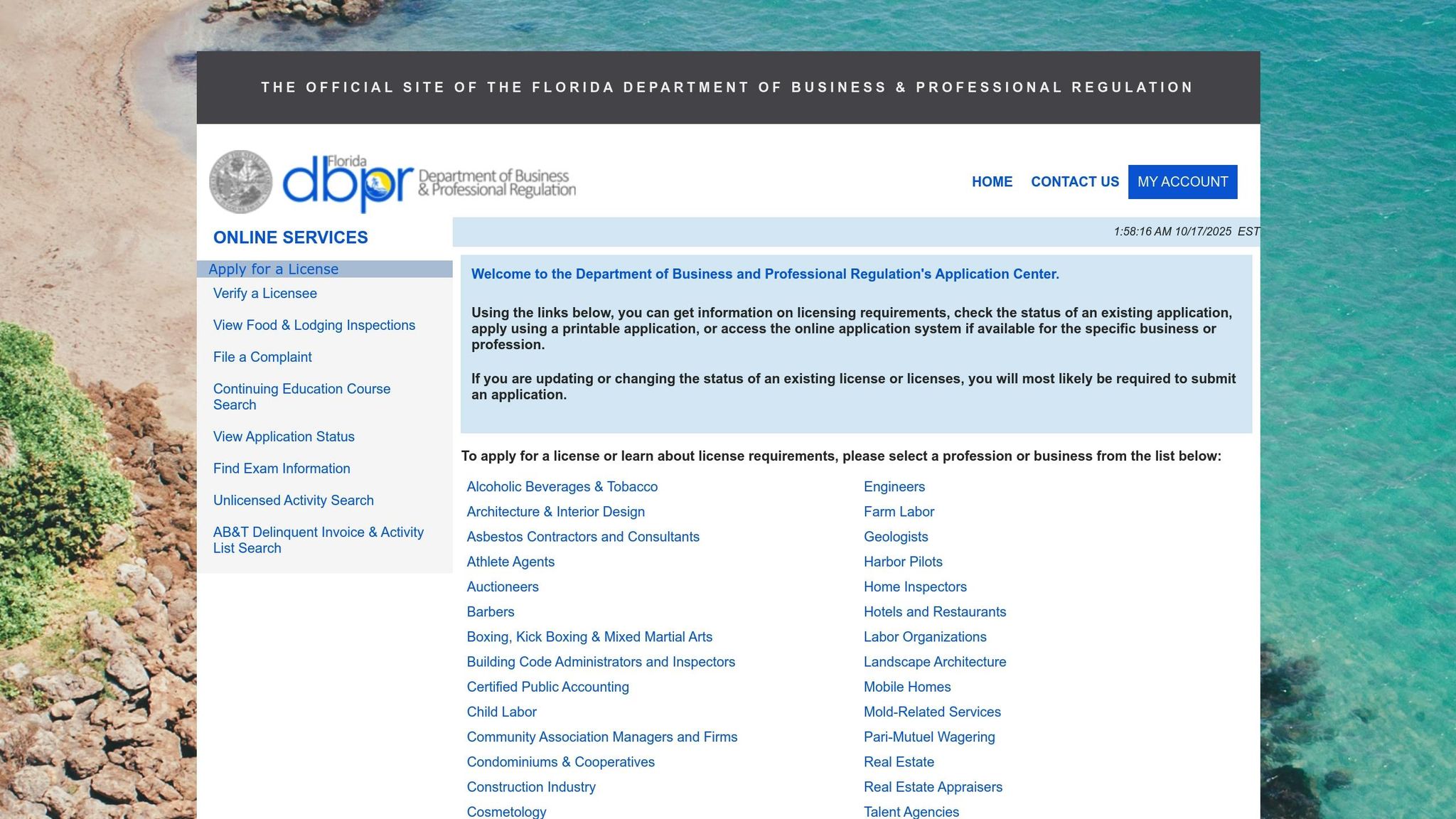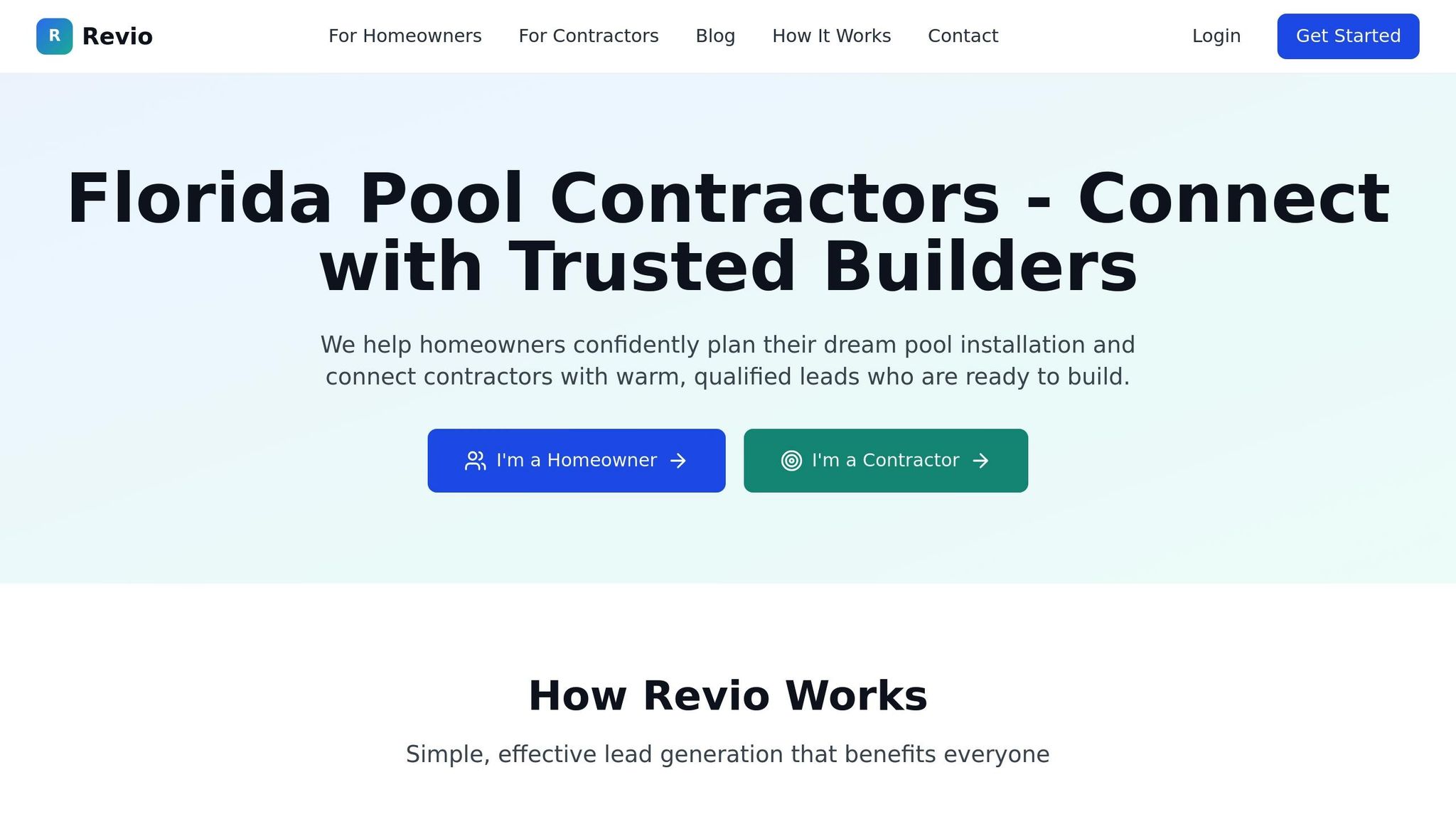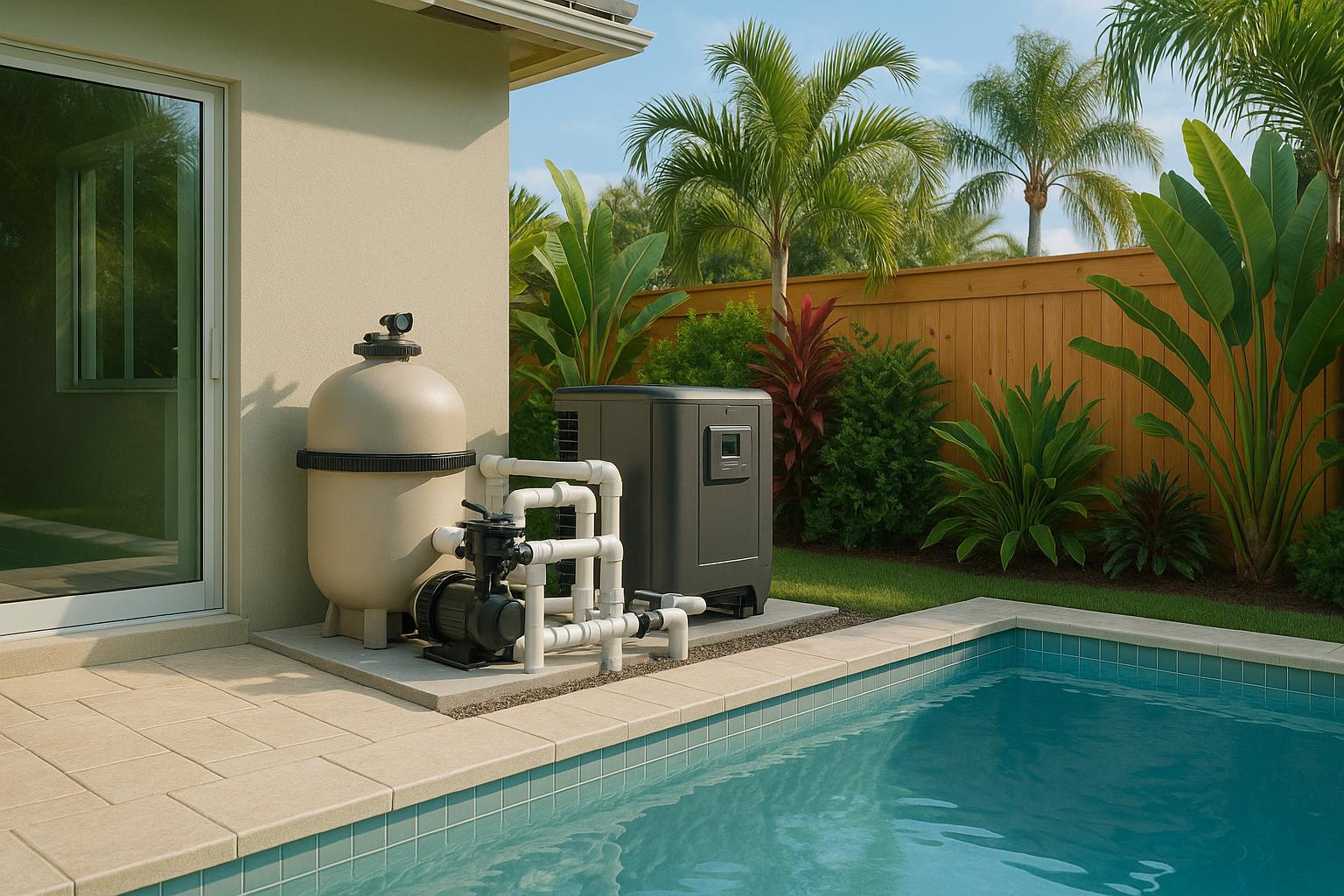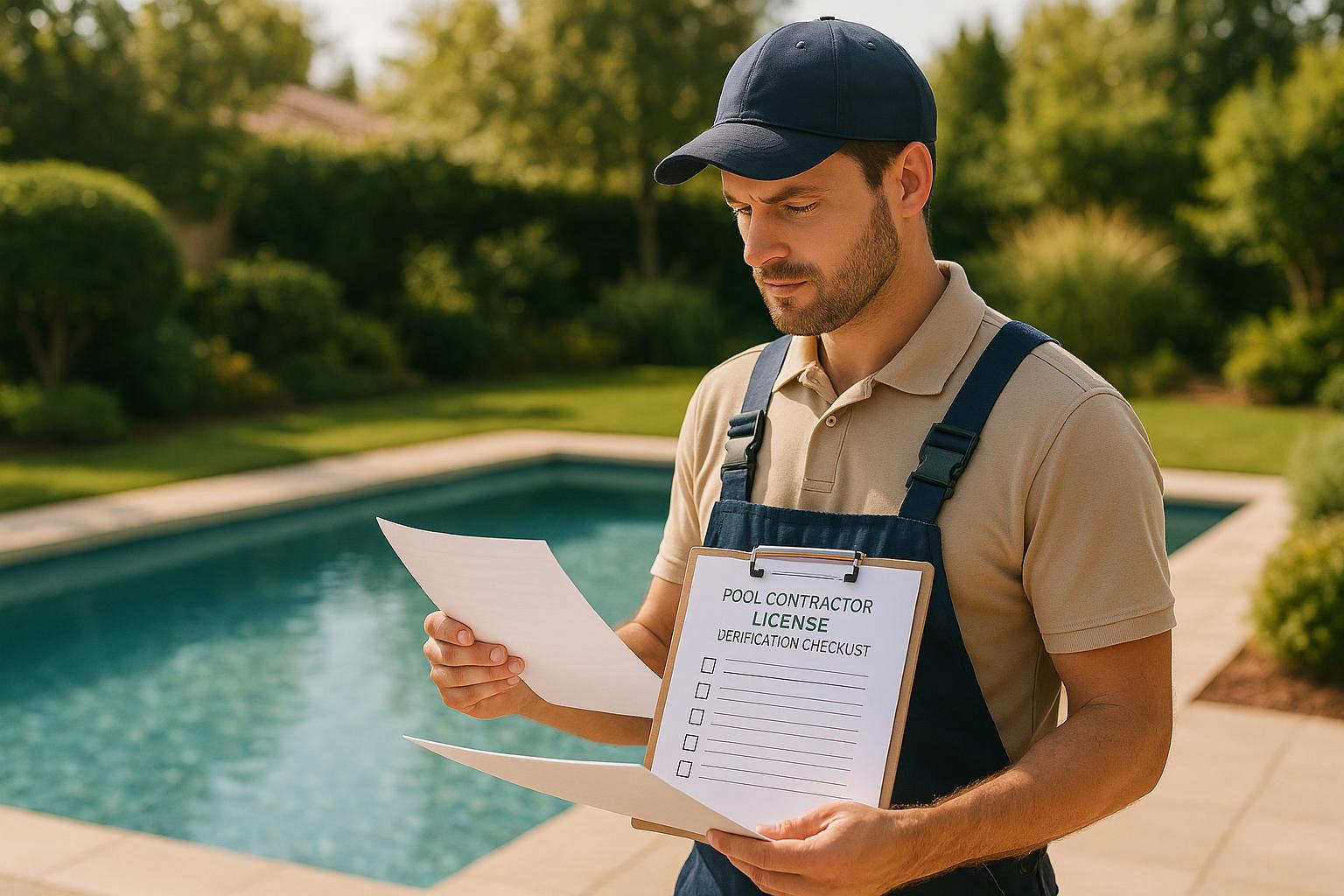Pool Contractor License Verification Checklist
Want to avoid costly mistakes when hiring a pool contractor in Florida? Verify their license first. Florida law requires pool contractors to have valid licenses to ensure they meet strict qualifications, carry insurance, and follow safety standards. Hiring an unlicensed contractor can result in legal issues, poor-quality work, and financial risks.
Here’s how to verify your contractor's license and protect your investment:
- Use the Florida DBPR Website: Visit MyFloridaLicense.com to check license status, expiration dates, and disciplinary history. Look for statuses like "Current, Active" or "Probation, Active."
- Request Key Documents: Ask for proof of insurance, bonding, and a written contract. Verify these details with insurers or agencies.
- Avoid Red Flags: Watch for missing license numbers, expired licenses, or contractors refusing to provide documentation.
Taking these steps ensures your contractor is qualified and your pool project is in safe hands. Read on for a detailed guide to verifying licenses, spotting warning signs, and ensuring a smooth project experience.
I-TEAM: Florida pool contractor gives up licenses after facing multiple complaints from Jacksonv...
Pool Contractor Licensing Basics in Florida
In Florida, pool contractors are required by law to hold a valid license. This ensures they have the necessary education, experience, and qualifications to handle pool construction projects. Below, we’ll break down the types of licenses, legal requirements, and the risks associated with hiring unlicensed contractors.
Florida Pool Contractor License Types
To legally work on pool construction projects in Florida, contractors must obtain a proper license. This license serves as proof that the contractor has met the state’s standards for education, experience, and skills. They are also required to pass exams that test both their trade expertise and business knowledge. Before you hire a contractor, always verify that their license is current and matches the scope of work your project demands.
Legal Requirements for Pool Contractors
Licensed contractors must meet specific legal and technical standards, which include passing exams and maintaining adequate insurance coverage. These requirements are in place to ensure contractors are both competent in their trade and capable of protecting their clients’ interests. Knowing these requirements can help you better evaluate the qualifications of any contractor you’re considering.
Problems with Unlicensed Contractors
Hiring an unlicensed contractor can expose you to serious financial risks. Without proper licensing, you could be held liable for property damage or injuries that occur during the project. Additionally, unlicensed contractors might lack the technical skills needed to deliver quality results, which could lead to delays and higher costs in the long run. Protect yourself by insisting on proof of licensing before signing any agreements.
How to Verify a Pool Contractor's License
Making sure your pool contractor has a valid license is a quick step that can save you from potential legal and financial headaches. In Florida, there are several reliable ways to confirm a contractor’s credentials. Here’s a breakdown of the best methods to verify their license.
Using the Florida DBPR Website
The go-to resource for checking a pool contractor’s license in Florida is the official website of the Florida Department of Business and Professional Regulation (DBPR) at MyFloridaLicense.com. This free platform provides real-time licensing details for all registered contractors in the state.
To get started, click on the "Verify a License" link. From there, you can search using the contractor’s first name, last name, city, or - if you have it - their specific license number. The search results will include key information like the contractor’s name, profession, address, and, most importantly, their license status.
If you encounter issues accessing the website, you can call the DBPR Customer Contact Center at 850-487-1395 for assistance. Alternatively, the DBPR mobile app offers the same functionality, letting you verify licenses from your phone.
Reading DBPR Search Results
Once you’ve pulled up the results, pay close attention to the contractor’s license status. Only contractors listed as "Current, Active" or "Probation, Active" are legally authorized to work in Florida.
It’s also important to check whether the contractor is labeled as "Certified" or "Registered". A certified contractor can work anywhere in the state, while a registered contractor is restricted to specific cities or counties. Make sure the license type aligns with your project’s needs, whether it’s for a residential or commercial job.
Don’t forget to verify the license’s expiration date and ensure that the contractor’s name and business details match what you’ve been provided. If the status reads "Probation, Active", it could indicate past issues, so it’s worth asking the contractor about their history before proceeding.
Other Ways to Verify Licenses
Beyond the DBPR website, you can request to see the contractor’s physical license certificate. Cross-check the license number on the certificate with the information in the DBPR database to confirm its validity.
For registered contractors who are limited to specific areas, you can also contact your local building department or county construction licensing board for further verification. Some counties, like Pinellas and Martin, maintain their own records for locally registered contractors.
Additionally, verifying the contractor’s insurance and bonding is just as important. You can do this by contacting their insurance provider directly. A valid license ensures the contractor has met Florida’s standards for education, experience, and insurance coverage, has passed a competency exam, and has undergone a criminal background check.
Lastly, the Construction Industry Licensing Board (CILB) plays a role in upholding contractor standards. They have the authority to discipline or revoke licenses for contractors who fail to meet industry expectations, adding an extra layer of protection for your project.
Required Documents and Warning Signs
When hiring a contractor, verifying their credentials is just the beginning. To protect your project, make sure you gather the right documents and stay vigilant for potential red flags.
Documents to Request from Contractors
Start by asking for the contractor's state-issued license from the DBPR (Department of Business and Professional Regulation). Be cautious - an occupational license or corporate filing is NOT the same as a contractor’s license. As the Miami Herald advises:
"Before hiring a contractor, ask to see their state-issued license. Then verify it."
An occupational license only confirms that a tax receipt was paid to the local municipality. It does not authorize someone to perform contracting work.
Here are the key documents you should request:
- Certificate of Insurance: This should show current General Liability and Workers' Compensation coverage. Always verify its validity by contacting the insurer directly.
- Proof of bonding: Check with the bonding agency to ensure the contractor is bonded. The Office of Florida Attorney General Ashley Moody emphasizes the importance of this step.
- USL&H insurance: This is essential for any work performed on or over water.
- A detailed written contract: The contract should include the contractor’s name, address, phone number, state license number, a description of the work, a timeline, a materials list, a completion date, cleanup responsibilities, and warranty details. For general, residential, or building contractors, it must also include a notice about your rights under the Florida Homeowners' Construction Recovery Fund.
Once you’ve gathered these documents, the next step is to be on the lookout for warning signs that could indicate trouble.
Warning Signs of Problem Contractors
Certain behaviors and omissions can signal a problematic contractor. Here’s what to watch for:
- Refusal to provide their license number or show their physical license. Licensed contractors are required to include their license number in all advertising.
- Inability to provide proof of current insurance or bonding.
- A license status that is anything other than "Current, Active" or "Probation, Active" in the DBPR database.
Questions to Ask Pool Contractors
After verifying documents and watching for red flags, ask the contractor pointed questions to evaluate their qualifications further. Here’s what you should confirm:
- "What is your Florida state contractor license number, and what specific type of pool contractor license do you hold?"
- "Can you provide current proof of General Liability insurance and Workers' Compensation coverage or exemption?"
- "Do you carry USL&H insurance since the work involves being on or over water?"
- "What is your experience level, and can you confirm you have at least four years of experience in this field?"
- "Are you registered with the local county licensing board, if required for this area?"
A trustworthy contractor should have no issue directing you to MyFloridaLicense.com for license verification. Taking these precautions will help ensure you’re working with a qualified professional.
sbb-itb-3649da6
Tools and Resources for License Verification
When it comes to verifying pool contractor credentials, having the right tools at your disposal can make the process much easier. Florida offers several official resources and platforms designed to connect you with qualified contractors. These tools build on the earlier verification steps discussed in this article, helping you ensure your pool project is in trustworthy hands.
Florida Department of Business and Professional Regulation (DBPR)

The Florida DBPR serves as the go-to authority for contractor license verification in the state. By visiting MyFloridaLicense.com, you can check a contractor's license status, expiration date, and any disciplinary records. Searches can be done using a contractor's name, business name, or license number. For contractors operating in specific counties, you can also verify their details through local boards, such as the licensing divisions in Pinellas County or Martin County. These official resources are essential for establishing a solid foundation in your verification process and are complemented by other specialized platforms.
Revio's Pre-Screened Contractor Network

For a more streamlined approach, Revio offers a platform that connects Florida homeowners with pre-screened, reliable pool contractors. All contractors in Revio's network have undergone thorough credential checks, including licensing, insurance, and experience verification.
In addition to simplifying contractor selection, Revio provides a free Pool Planning Guide tailored specifically for Florida homeowners. This guide includes comparisons of pool types, cost breakdowns, permit checklists, and tips for evaluating contractors - all designed with Florida's unique regulations and climate in mind. By focusing on pre-vetted professionals, Revio saves you time and effort, ensuring peace of mind throughout your pool project.
To explore the best verification method for your needs, check out the following comparison of available tools.
Verification Tool Comparison
Each verification tool has its own strengths and limitations. Here’s a quick breakdown of the main options:
| Tool | Best For | Features | Limitations |
|---|---|---|---|
| DBPR Website | Comprehensive official verification | Access to license history, disciplinary actions, and complaint records | Requires manual searching |
| Local County Boards | County-certified contractors | Verifies local registration and compliance with municipal requirements | Limited to specific geographic areas |
| Revio's Network | Streamlined contractor selection | Pre-screened professionals and free planning resources | Limited to network participants |
For additional insights into a contractor’s reputation, you can also visit the Better Business Bureau at bbb.org. The BBB provides ratings ranging from A+ to F, along with customer reviews and details on complaint resolution history. By using these tools, you can confidently select a contractor based on verified, trustworthy information.
Best Practices for Homeowners
Protecting your investment when hiring a licensed pool contractor starts with careful planning and thorough verification. Here’s how you can ensure your project is in good hands.
Steps to Verify Contractors Before Hiring
Beyond checking licenses, there are additional steps you can take to safeguard your project.
Start by verifying the contractor's license before requesting quotes. Use the Florida DBPR website to confirm their licensing status, and then cross-check with local county boards if your project requires municipal permits. This ensures the contractor meets all necessary legal requirements.
Ask for their license number, proof of insurance, and references from past projects upfront. Once you’ve gathered this information, request a detailed written estimate. This estimate should clearly outline the scope of work, list materials, include a completion timeline, and specify the total cost. Comparing estimates from multiple licensed contractors will give you a better sense of fair pricing and ensure nothing important is overlooked.
Finally, double-check that all details match across the documents you receive. Consistency is key to avoiding misunderstandings or potential disputes.
Keeping Records and Communication Clear
Once you’ve verified the contractor’s credentials, focus on maintaining clear communication and meticulous recordkeeping.
Secure a written contract that outlines every detail of the project, including the scope of work, timeline, materials, cleanup responsibilities, and warranty terms. The contract should also include the contractor’s name, address, phone number, state license number, and a warranty agreement that specifies coverage length and terms.
For projects involving general, residential, or building contractors, make sure the contract includes a notice about the Florida Homeowners' Construction Recovery Fund. This fund offers financial protection if a licensed contractor fails to complete the job or address construction defects.
Keep copies of all contracts, communication records, and proof of payments. These documents are essential if any issues arise during or after the project. Additionally, set a payment schedule that withholds the final payment until the necessary permits are closed.
A red flag to watch for: contractors who refuse to provide a written contract. This can be a sign of unlicensed or unreliable professionals.
Using Revio's Pool Planning Guide
Revio offers a free Pool Planning Guide designed specifically for Florida homeowners, making it a valuable resource for contractor evaluation and project planning.
This guide includes detailed contractor evaluation checklists to help you ask the right questions during interviews and compare proposals effectively. It also provides regional pricing insights, helping you spot estimates that are either unusually high or suspiciously low - both of which could signal potential problems.
Additionally, the guide features a permit checklist to ensure your contractor meets all regulatory requirements. When used alongside your license verification efforts, this checklist gives you a thorough understanding of contractor compliance and project legitimacy.
For long-term planning, the guide includes maintenance planning worksheets to help you prepare for ongoing pool care. These resources make it easier to manage your project and maintain your investment over time.
Conclusion: Protecting Your Pool Project
Making sure your pool contractor is properly licensed isn’t just a formality - it’s a crucial step to avoid expensive mistakes and potential legal headaches. The Florida Department of Business and Professional Regulation (DBPR) website is a reliable tool to confirm a contractor’s credentials, check their disciplinary history, and ensure they're qualified for your specific project.
Beyond verifying licenses, there are other essential steps to keep your project on track. Limit down payments, insist on a detailed written contract, and remember that an occupational license alone doesn’t grant permission to perform contracting work. Trust your gut if something doesn’t feel right, and stay alert to red flags that could signal trouble.
To safeguard your investment, take a comprehensive approach: confirm licensing through the DBPR, request proof of insurance and references, secure a thorough written contract, and ensure all required permits are in order. Keeping detailed records of every payment, document, and interaction throughout the process adds an extra layer of protection.
If you’re looking for additional help, tools like Revio's free Pool Planning Guide offer valuable resources, including evaluation checklists and regional pricing insights. Pairing these tools with proper license verification gives you the confidence to move forward, knowing you’ve done your homework.
A little extra effort upfront can make a huge difference. By following these steps, you’re not just protecting your investment - you’re also saving yourself from unnecessary stress and costly surprises down the line.
FAQs
What risks should I be aware of when hiring an unlicensed pool contractor in Florida?
Hiring an unlicensed pool contractor in Florida comes with serious risks that can jeopardize both your project and your peace of mind. These contractors often lack the proper training, experience, and insurance, which can lead to subpar work or even create safety hazards. A valid license ensures that the contractor has passed mandatory competency exams, something unlicensed contractors haven’t done. Plus, if something goes wrong, your homeowner’s insurance likely won’t cover the damages.
Another major concern is the lack of legal protection. If disputes or issues arise, resolving them or seeking compensation can be extremely challenging when dealing with an unlicensed contractor. To safeguard your investment and avoid unnecessary headaches, always verify that your contractor is licensed and qualified for the job.
How can I verify that a pool contractor's insurance and bonding are valid and current?
To confirm a pool contractor's insurance and bonding are valid, begin by asking the contractor for proof of insurance. Once you have the information, reach out to the insurance company to verify that the policy is active and offers sufficient coverage. For bonding, request a copy of the bond certificate and check its validity with the issuing company. Taking these steps can safeguard you from liabilities and ensure the contractor complies with legal obligations.
What key details should I include in a contract with a pool contractor to protect my investment?
To protect your pool project and ensure everything runs smoothly, it’s important to have a well-drafted contract with your contractor. Make sure the agreement covers these essential details:
- A clear and thorough description of the work to be done, including every task and the materials to be used.
- A payment schedule that specifies deposit amounts and when progress payments are due.
- A realistic timeline for the project, with defined start and finish dates.
Before signing anything, double-check that the contractor has a valid license and meets Florida’s certification requirements. These steps can go a long way in safeguarding your investment and preventing potential issues with quality or legal disputes.
Tags:
Related Articles

Best Pool Features for Florida Climate
Explore essential pool features for Florida's climate, including heat-resistant materials, cooling systems, and storm protection for year-round enjoyment.

Florida Pool Equipment Installation Rules
Learn about Florida's pool equipment installation rules, including safety, licensing, permits, and compliance with local regulations.

Top Florida Lenders for Pool Loans
Explore top lenders in Florida for pool financing, comparing rates, terms, and unique features to help you fund your dream pool project.
Ready to Start Your Pool Project?
Connect with trusted, pre-screened pool contractors in Florida
Get Started Today